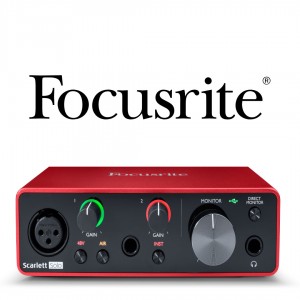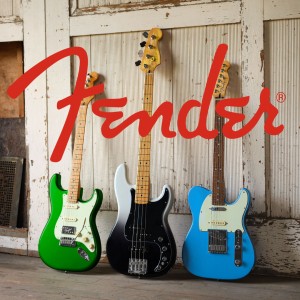
Guitar Strings: A Guide to Choosing the Right Ones for You

Navigating the various considerations can be daunting at first.
Choosing the right guitar strings is important because it can significantly impact the sound and playability of your guitar. The type of strings you choose can affect the tone, volume, sustain, and overall feel of your guitar. For example, if you choose heavier gauge strings, you may get more volume and sustain, but they may be harder to play if you have a lighter touch. On the other hand, lighter gauge strings may be easier to play, but they may not provide as much volume or sustain.
Additionally, the type of music you play can also influence the type of strings you should choose. Different genres of music require different tonal qualities, and certain types of strings can help you achieve the desired sound. For example, flatwound strings are often used in jazz and blues styles because they produce a warm, smooth sound that is well-suited to those genres.
Furthermore, the type of guitar you have can also influence the type of strings you should choose. Different types of guitars have different tonal qualities, and choosing the right strings can help you get the most out of your instrument.
In this guide, we'll explore the various types of guitar strings and factors to consider when choosing the right ones.

Types of Guitar Strings
Guitar strings come in different materials, gauges, and coatings. Here's a breakdown of the most common types of guitar strings:
- Steel Strings: Steel guitar strings are the most popular type of guitar strings and are widely used by guitar players of all levels and styles. They are made from steel wire that is wound around a core wire, which gives them their bright and crisp tone.
Steel strings come in a variety of gauges, ranging from light to heavy. The gauge of the strings refers to the thickness of the string, and it can impact the playability and tone of the guitar. Lighter gauge strings are easier to play and can produce a brighter, more delicate tone, while heavier gauge strings require more force to play and can produce a fuller, more powerful sound.
The material used to make the strings can also impact the tone of the guitar. The most common materials used in steel guitar strings are nickel-plated steel and stainless steel. Nickel-plated steel strings produce a warm and balanced tone, while stainless steel strings produce a brighter and more aggressive tone. Steel guitar strings are commonly used in electric guitars and acoustic guitars with steel-string construction. They are known for their durability, longevity, and consistent tone. However, steel strings can be tough on the fingers, especially for beginners or players with sensitive skin. In some cases, playing steel strings can cause calluses or blisters to form on the fingertips.
To help reduce the strain on the fingers, some steel strings come with a coating, such as polymer or Teflon. The coating can also help to extend the life of the strings by protecting them from corrosion and dirt. Coated strings are often more expensive than uncoated strings but can be worth the investment for players who want to maintain a consistent tone and reduce the frequency of string changes.
In conclusion, steel guitar strings are a popular choice for guitar players due to their bright and crisp tone, durability, and longevity. However, they can be tough on the fingers, and choosing the right gauge and material is important to achieve the desired tone and playability.
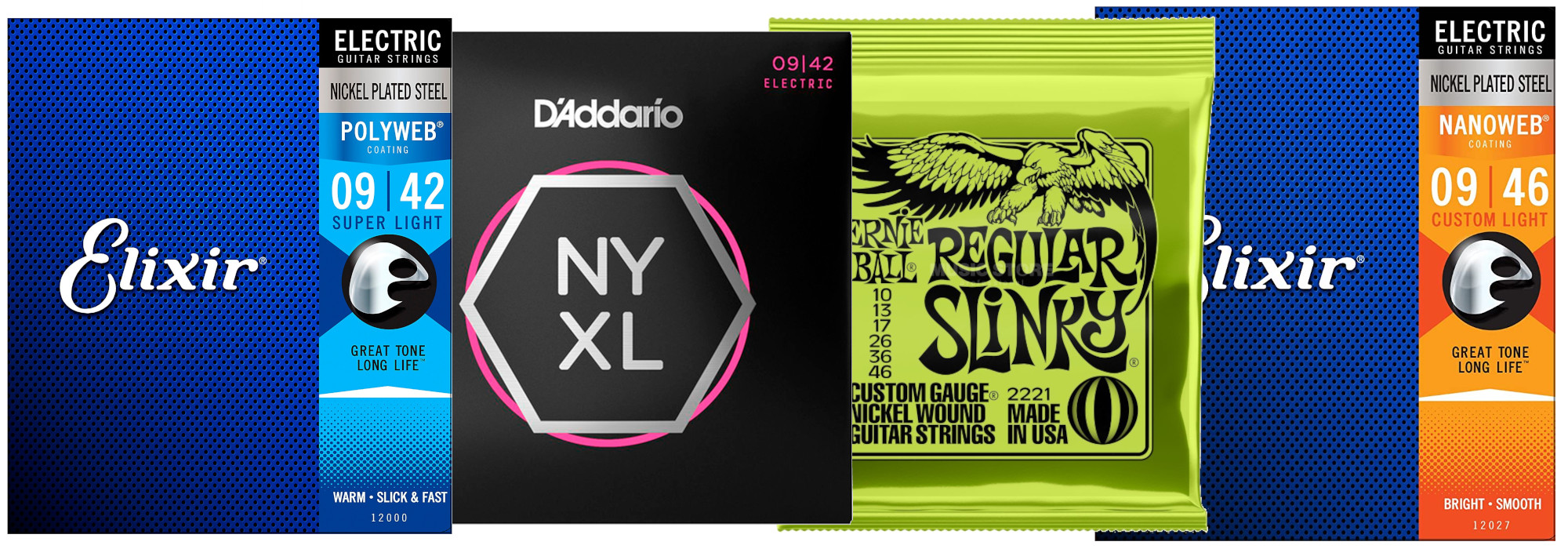
- Nickel Strings: Nickel guitar strings, also known as nickel-plated steel strings, are a type of guitar string that is made from a steel core that is wrapped with nickel-plated steel wire. They are a popular choice among guitar players due to their versatility and balanced tone.
Nickel strings are available in a variety of gauges, ranging from light to heavy. The gauge of the strings refers to the thickness of the string, and it can impact the playability and tone of the guitar. Lighter gauge strings are easier to play and can produce a brighter, more delicate tone, while heavier gauge strings require more force to play and can produce a fuller, more powerful sound.
Nickel strings are often preferred by guitar players who want a warm, balanced tone that is well-suited to a variety of musical genres. They are particularly popular among jazz and blues players, who appreciate their smooth, mellow tone. One of the benefits of nickel strings is their durability. The nickel plating on the strings helps to protect them from corrosion and extends their lifespan. However, as with any type of guitar string, they will eventually need to be replaced.
Nickel strings can also be coated with a polymer or other material to provide additional protection from corrosion and dirt. Coated nickel strings are often more expensive than uncoated strings but can be worth the investment for players who want to maintain a consistent tone and reduce the frequency of string changes. In terms of playability, nickel strings are generally easy on the fingers and are a good choice for players who are just starting out or who have sensitive skin. However, some players may find that nickel strings are not as responsive or bright as other types of strings, such as steel strings.
In summary, nickel guitar strings are a versatile and durable option that can provide a warm, balanced tone that is well-suited to a variety of musical genres. They are a good choice for players who want a string that is easy on the fingers and provides consistent performance.
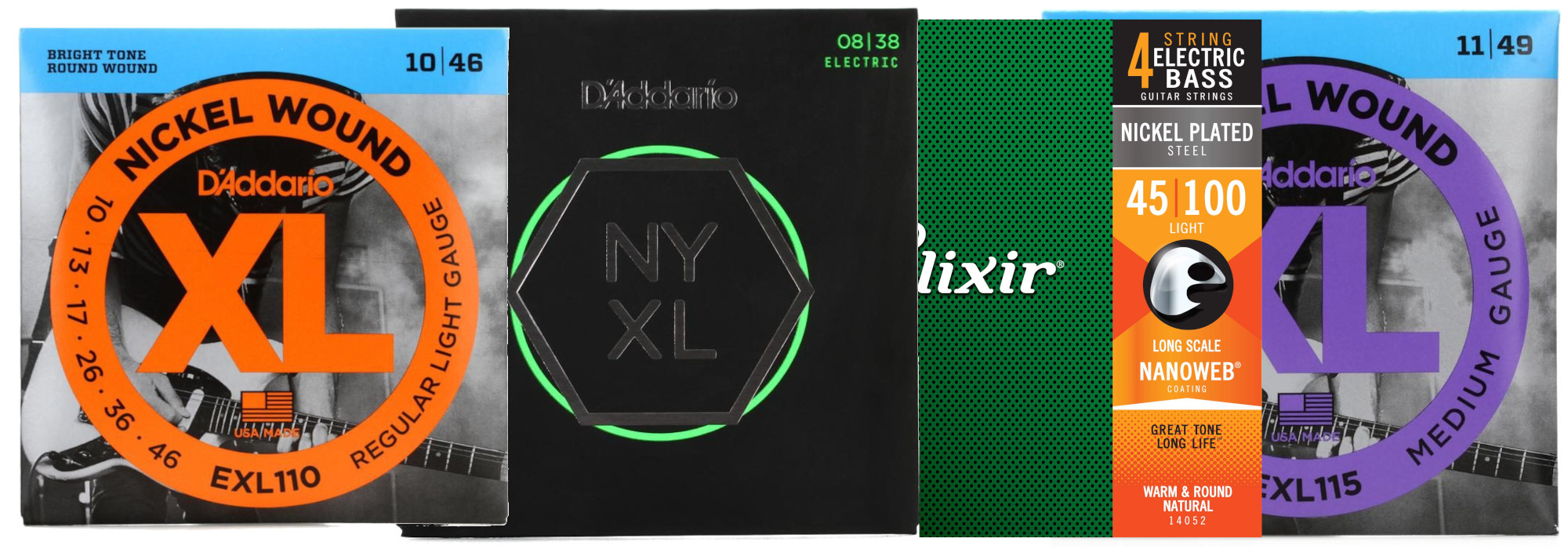
- Phosphor Bronze Strings: Phosphor bronze strings are a type of guitar string that are made from an alloy of copper and zinc, with a small amount of phosphorus added to enhance their durability and tonal characteristics. They are a popular choice among acoustic guitar players and are known for their warm, rich tone.
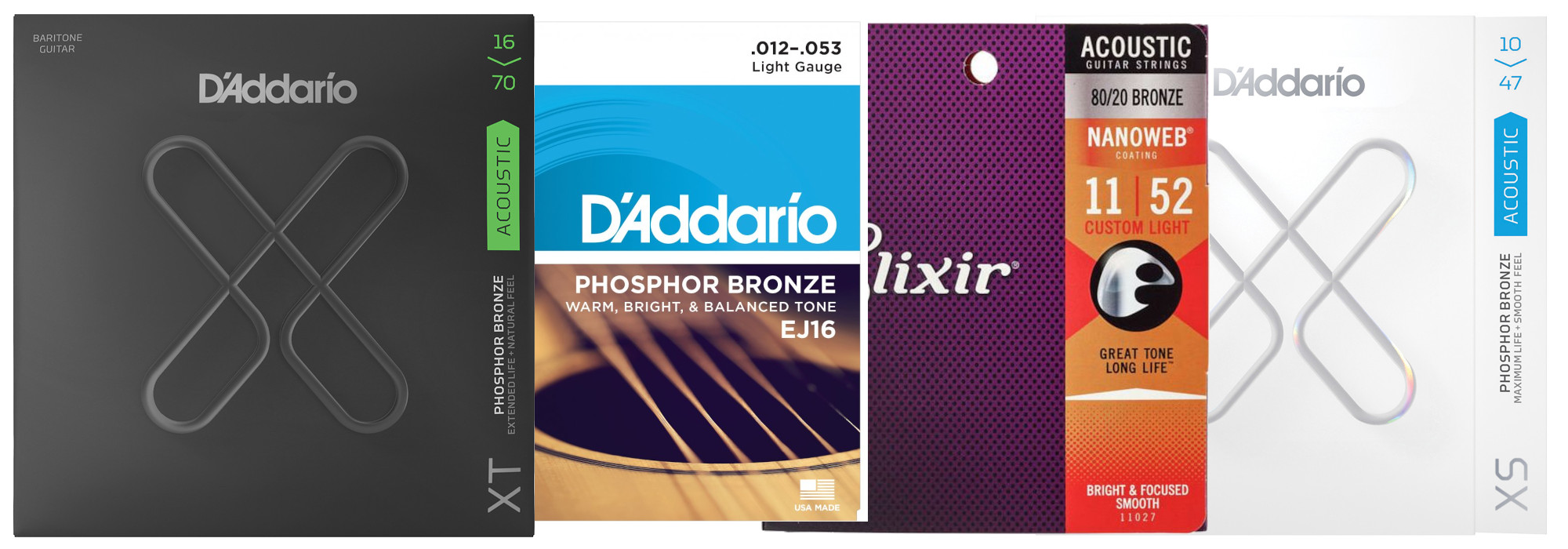
- Silk and Steel Strings: Silk and steel guitar strings, also known as "folk" or "mellow" strings, are a type of acoustic guitar string that have a softer, more mellow tone than traditional steel strings. They are made by winding silk and steel fibers around a core of nylon or silk.
Silk and steel strings are a popular choice among fingerstyle guitar players and those who play folk, blues, or other acoustic styles that require a softer, more delicate sound. They have a warmer, less bright tone than traditional steel strings, and their lower tension makes them easier to play for beginners or players with weaker hands. Silk and steel strings are available in a variety of gauges, but they tend to be lighter than traditional steel strings. They are also usually shorter in length, as they are designed for use on smaller, folk-style guitars.
One of the benefits of silk and steel strings is their ease of playability. Their lower tension and softer feel make them more comfortable for players who are just starting out or who have hand injuries or arthritis. Silk and steel strings do tend to have a shorter lifespan than traditional steel strings, as the softer materials used in their construction can wear out more quickly. However, they are generally more affordable than other types of guitar strings, so they can be a good option for players on a budget.
In summary, silk and steel guitar strings are a soft, mellow alternative to traditional steel strings. They are a good choice for fingerstyle guitar players, beginners, or anyone who wants a softer, more delicate sound from their guitar.
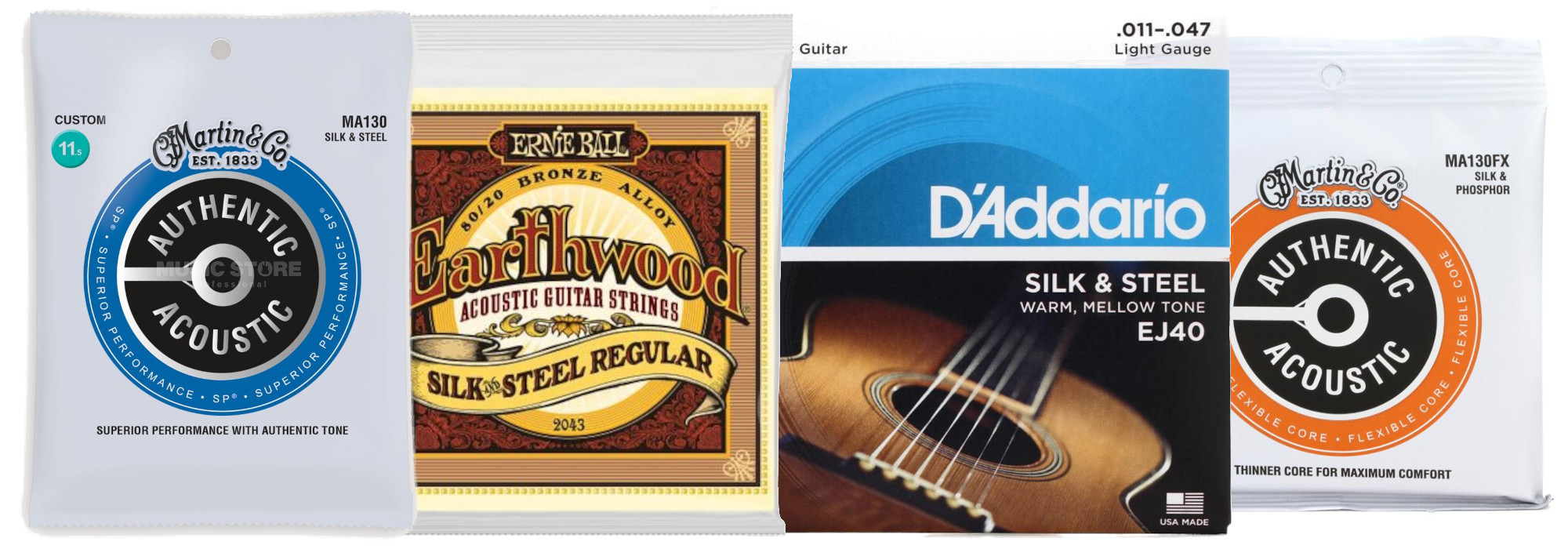
- Flatwound Strings: Flatwound guitar strings are a type of electric or jazz guitar string that have a flat, smooth surface due to the winding process. They are made by wrapping a round steel wire with a ribbon of metal (usually nickel) that is then flattened using rollers, resulting in a smooth, flat surface.
Flatwound strings have a unique tone that is smooth, mellow, and well-balanced. They produce less finger noise and have a longer sustain than roundwound strings. Their flat surface also makes them more comfortable to play, as they create less friction between the fingers and the strings. Flatwound strings come in a variety of gauges, from light to heavy. They are popular among jazz guitar players due to their mellow tone and smooth playing feel, but they can be used for other styles of music as well.
One of the drawbacks of flatwound strings is that they can be more expensive than other types of strings. They also have a more limited tonal range compared to roundwound strings, and they may not be ideal for players who want a brighter or more aggressive sound. In terms of playability, flatwound strings are generally easier to play than roundwound strings, as their smooth surface creates less friction and reduces finger fatigue. They are also less prone to string noise, making them a good choice for recording sessions.
In summary, flatwound guitar strings are a unique type of electric or jazz guitar string that have a smooth, mellow tone and a comfortable playing feel. They are a good choice for jazz guitar players or anyone who wants a smoother, less aggressive sound from their guitar.
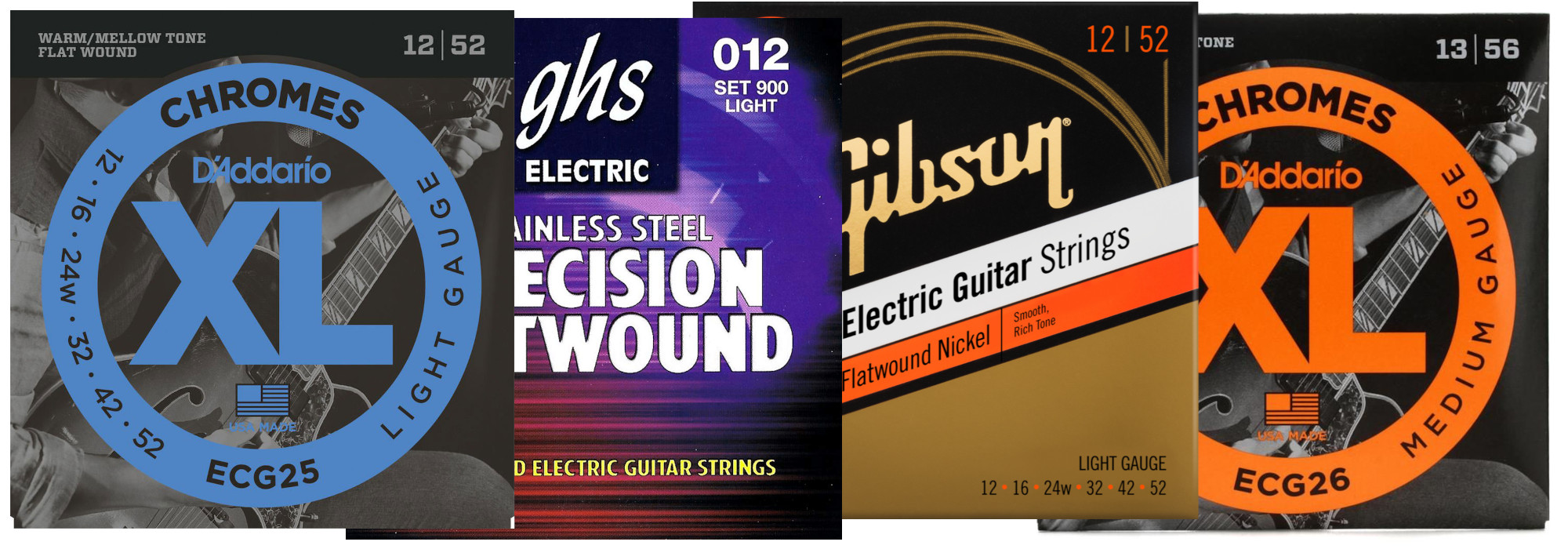
Factors to Consider When Choosing Guitar Strings
When choosing guitar strings, there are several factors to consider:
- Playing Style: Your playing style will dictate the type of guitar strings you should choose. If you play with a heavy hand, you may want to opt for heavier gauge strings that can handle the extra tension. If you play with a lighter touch, lighter gauge strings may be more comfortable and easier to play.
- Genre: The type of music you play can also influence the type of guitar strings you should choose. For example, if you play blues or jazz, you may want to consider flatwound strings. If you play acoustic styles, you may want to consider phosphor bronze or silk and steel strings.
- Guitar Type: The type of guitar you have can also influence the type of strings you should choose. Electric guitars typically use steel or nickel strings, while acoustic guitars can use a variety of strings, depending on the sound you're looking for.
- Coatings: Some guitar strings come with coatings that can extend the life of the strings and reduce finger noise. Coated strings are often more expensive, but they may be worth the investment if you want strings that last longer.
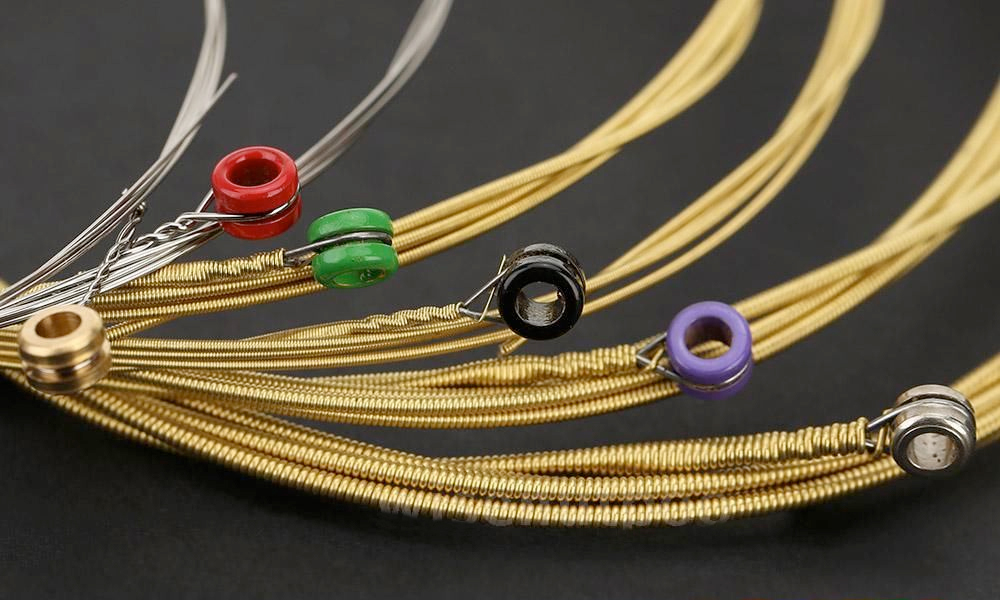
Choosing the right guitar strings can be a daunting task, but it's essential to find strings that work well with your playing style, genre, and guitar. Here at Musicmaker, we've been helping out guitar players with any and all of their needs for more than 40 years. We have a wealth of knowledgable staff on hand to answer your questions so drop in to the store or feel free to get in touch through the site.
Here's a video below with some good examples.......Just in case......



